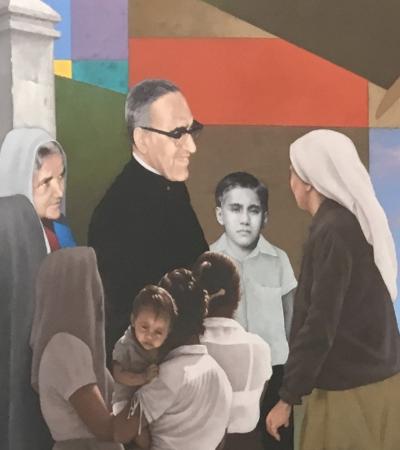Romero in Context (VIRTUAL)

This first session in the "Romero and Catholic Social Teaching Work-in-Progress Series" features chapters by Sr. Ana Maria Pineda, RSM (Santa Clara University) and Michael Lee (Fordham University). Abstracts of their chapters appear below, and preparation materials will be sent to confirmed participants prior to the session.
Participation is limited to a small number of faculty and graduate students. Please register here to be considered for participation.
This series is sponsored by Latin American/North American Church Concerns (LANACC).
Romero: A Man in Search of God and Truth
Sr. Ana Maria Pineda, Santa Clara University
Two significant characteristics shaped Oscar Romero’s life. This presentation will address how he was a man always in search of God, and a man who sought truth. Because the developments in El Salvador and Romero’s life form part of the key background for understanding Romero, this journey takes place in the context of a particular time and place. A significant figure in this journey is Rutilio Grande. The two men encounter each other at the crossroads of the social, political and ecclesial changes occurring in El Salvador and the world. In this search for God and Truth, the figures of Monseñor Oscar Romero Galdámez and Rutilio Grande García, S.J. come together. Popular devotion for the two martyrs has developed into the idea of Grande’s death as creating a climactic moment of conversion for Romero. But research paints another less dramatic, perhaps more humanly inspiring picture of the relationship between the two men. With the passage of the years, it is difficult to fully ascertain the actual degree of their friendship. However, in life and after Grande’s death, his memory still accompanies Archbishop Romero. Ultimately, they both present compelling models of lives unfolding in a world of conflict and oppression, and of personal spiritual journeys purified through failure and human weakness. Their cultural roots, family influences, spiritual struggles, their proximity to each other’s life, and their fundamental humanness provide a model of discipleship for all contemporary Christians.
Óscar Romero & Liberation Theology
Michael Lee, Fordham University
This chapter seeks to explore whether and how the legacy of St. Óscar Romero is to be understood in relation to liberation theology. Thus far, the literature has offered a range of options: Romero as suspicious of liberation theology throughout his ministry (Morozzo), Romero as graciously accepting the input of liberation theologians while ignoring their ideas (Colorado, Delgado), and Romero as a representative of liberation theology (Brockman, Dussel). While the answer has important implications for interpreting Romero’s legacy, it also touches upon the way that the struggle for human liberation affects Christianity’s basic ideas (such as Christology, soteriology, and ecclesiology) and its practice. Ultimately, evaluating Romero and liberation theology makes a statement about how Christian faith should be lived today.
The chapter will proceed in three main steps. The first two will be to define the object of study – liberation theology. After identifying it as a kind of school of thought with central ideas, this paper will focus on liberation theology as embodied, by particular actors and specific practices, in El Salvador during Romero’s episcopal ministry in the 1970’s. It will show that prior to becoming Archbishop of San Salvador, Óscar Romero could be considered an opponent of liberation theology. The paper will conclude, however, by analyzing Romero’s homilies, writings, and important pastoral actions as archbishop to suggest that by the time of his assassination he, in fact, articulated and practiced a liberation theology that provides a model for the church today.





